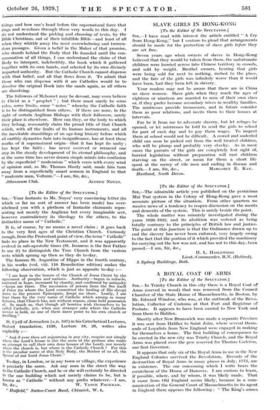[To the Editor of the SPECTATOR.]
SIR,—Your footnote to Mr. Noyes' very convincing letter (to which so far no sort of answer has been made) has over- whelmed you with a plethora of fantastic claimants repre- senting not merely the Anglican but every imaginable sect, however contradictory its theology to the others, to the distinctive name of" Catholic."
It is, of course, by no means a novel claim ; it goes back to the very first ages of the Christian Church. Curiously enough, from the Protestant point of view, the term" Catholic" finds no place in the New Testament, and it was apparently evolved in sub-apostolic times (St. Irenaeus is the first Father to use it) to distinguish the True Church from the various sects which sprung up then as they do to-day.
The famous St. Augustine of Hippo in the fourth century, in his works (vol. viii. 110 Benedictine edition) makes the following observation, which is just as apposite to-day :— " I am kept in the bosom of the Church of Jesus Christ by the agreement of peoples and nations. Authority—begun in miracle, nurtured in hope, increased by charity, and confirmed by antiquity —keeps me there. The succession of priests from the Seo itself of Peter (to whom the Lord committed the feeding of His sheep) down to the present Episcopate, keeps me there. Lastly, I am kept there by the very name of Catholic which among so many heresies, that Church has, not without reason, alone held possession of. So much so, that though all heretics wish themselves to be called Catholic, yet, when any stranger asks where the Catholic service is held, no one of them dares point to his own church or dwelling."
St. Cyril of Jerusalem (A.D. 347) in his Cateehetical Lectures, Oxford translation, 1838, Lecture 18, 26, writes also explicitly And if ever thou art sojourning in any city, enquire not simply where the Lord's house is (for the sects of the profane also make an attempt to call their own dens houses of the Lord), nor merely where the church is, but where is the Catholic Church ? For this is the peculiar name of this Holy Body, the Mother of us all, the Spouse of our Lord Jesus Christ.'
To-day, in London, or in any town or village, the experience is precisely the same. Ask any man in the street the way to the Catholic Church, and he or she will certainly be directed to the one building which not merely claims to be, but is
known as " Catholic " without any prefix whatever.—! am, "Hatfield," Sutton-Court Road, Chiswick, W. 4.


















































 Previous page
Previous page